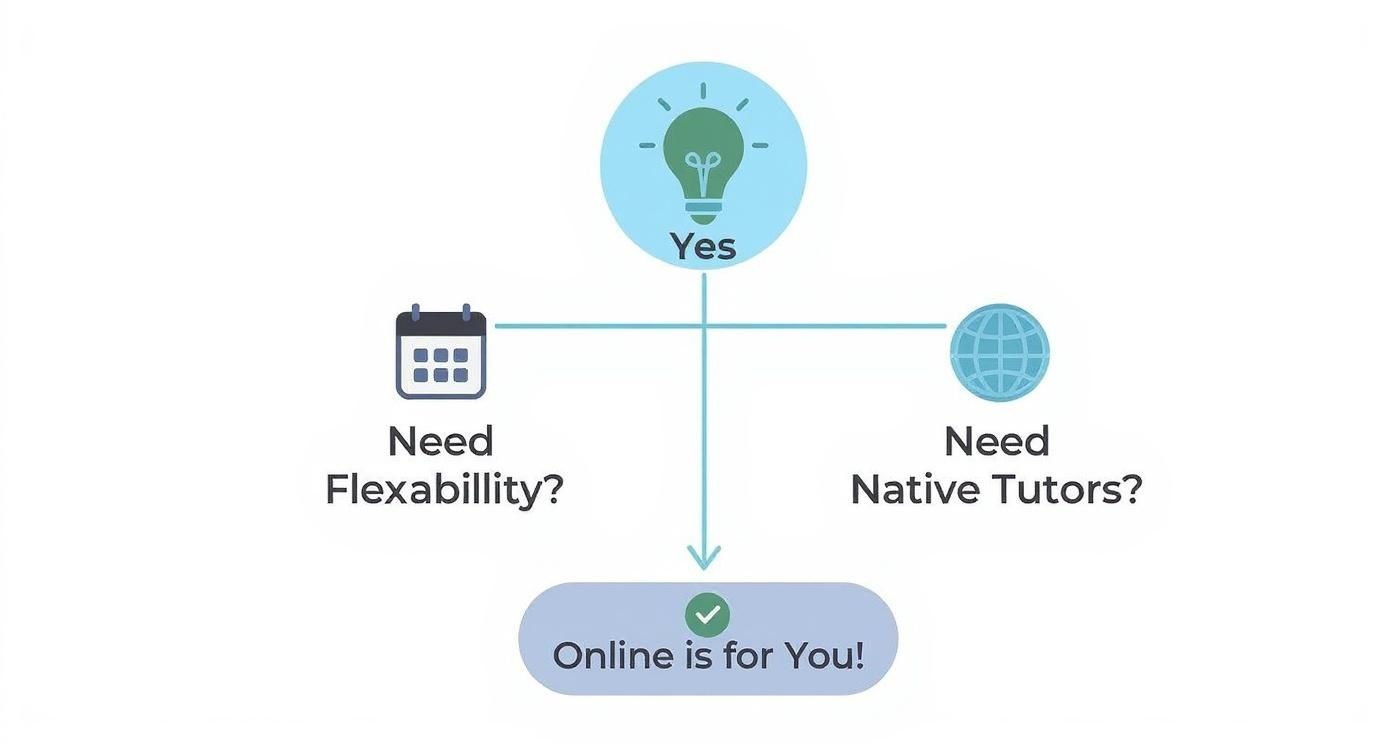A Guide to Online English Language Classes
Think of an online English class as a live, interactive lesson with a real teacher, all happening over the internet. It gives you direct access to qualified instructors and a structured learning path from literally anywhere, making fluency a much more realistic goal.
Your Journey to English Fluency Starts Here
Picture a personalised language gym where you can work out your speaking, listening, reading, and writing skills whenever it suits you. That's the core idea behind online English language classes. They're much more than just a video call; they offer a genuinely dynamic and effective way to get to grips with the world's most spoken language.
For learners here in Singapore and all over the world, these virtual classrooms are a game-changer. Technology has completely torn down the old geographical barriers, connecting students directly with native-speaking teachers and well-thought-out lesson plans. It's a learning style that just fits with modern life.
The New Standard for Language Learning
But this isn't just about being convenient—it's about being effective. The best platforms today are packed with interactive tools, give you feedback in the moment, and let you schedule lessons on your own terms. This creates a really rich learning environment that can be moulded to fit what you're trying to achieve.
So, what's in it for you?
- Career Advancement: Get a handle on business English to communicate with confidence, whether you're in a meeting or giving a presentation.
- Academic Success: Get ready for big exams like the IELTS or TOEFL with lessons that zero in on the specific skills you need to pass.
- Personal Growth: Build the confidence to travel the world, chat with new people, and enjoy English-language books and films without a second thought.
The real magic of learning online is how it adapts to you. Need to work on your pronunciation for a job interview? Or maybe nail down your grammar for an important essay? The entire experience can be shaped around your personal goals.
At the end of the day, online English classes provide a clear, structured path to fluency. They bring together the focused teaching of a traditional classroom with the flexibility that our busy schedules demand. This guide will take you through everything you need to know, from the key benefits and different types of classes to choosing the right programme to get you started. Your journey to speaking English with confidence begins now.
The Real Benefits of Learning English Online
Sure, learning from your couch is convenient, but the real power of online English classes goes way beyond that. They bring together access, affordability, and a personal touch in a way that traditional classrooms often can't quite manage. This modern approach knocks down many of the old barriers that used to stand in the way of fluency.
Think about it: how easy is it to find a qualified, native-speaking English teacher in your neighbourhood who’s free at the exact time you are? It can be a real headache. Online platforms solve this problem by connecting you to a massive global pool of instructors. Suddenly, you can learn from an expert in London, Sydney, or Toronto without ever leaving your home.
This worldwide reach means you're no longer stuck with whoever happens to be local. You can find an instructor whose teaching style and expertise genuinely match what you need to learn.
Smarter Learning and Financial Savings
Beyond just finding the right teacher, online classes are usually much lighter on the wallet. Traditional language schools have to pay for rent, utilities, and physical materials, but online providers don't have those overheads and can pass the savings on to you. Plus, you save your own time and money by cutting out the daily commute, making it far easier to squeeze lessons into a packed schedule.
But the savings are only half the story. The technology that powers these platforms creates a learning environment that actually adapts to you.
- Personalised Pace: The curriculum can move as fast or as slow as you need. If you nail a grammar concept right away, you can move on. But if you’re struggling with certain words, the system can give you extra practice until you’ve got it.
- Targeted Feedback: In a one-on-one session, your instructor can give you instant, private feedback, helping you fix mistakes the moment you make them.
- Confidence Building: Let's be honest, speaking a new language can be intimidating. Practising from the comfort of your own home, often one-on-one, takes away the fear of messing up in front of a big group. This low-pressure setting is perfect for building the confidence you need for real-world conversations.
Think of it like having a personal trainer who designs a workout just for you. Instead of a generic, one-size-fits-all class, your lessons focus on strengthening your specific weak spots, which means you see faster, more tangible results.
A Path Built Just for You
At the end of the day, the biggest win is the shift from a rigid, group-based curriculum to a flexible path that puts you, the learner, at the centre. Online English classes give you the keys to your own education. You pick the teacher, you set the schedule, and you follow a learning plan designed to help you succeed.
This level of customisation makes sure every single lesson is relevant and moves you closer to your specific goals, whether that’s nailing a job interview or just feeling more comfortable ordering a coffee on your next holiday. It’s simply a smarter, more efficient way to learn.
Finding the Right Type of Online English Class
Jumping into the world of online English language classes can feel a bit like staring at a huge restaurant menu. There are so many options, each with its own unique flavour. The best choice really comes down to your personal learning style, your budget, and what you hope to achieve.
Let's break down the three main formats you'll come across: one-on-one private lessons, small group classes, and those Massive Open Online Courses, or MOOCs. Each one is built for a different kind of learner.
One-on-One Private Tuition
Picture this: a personal language coach whose entire focus is on you. That’s exactly what private tuition is all about. These lessons offer 100% personalised attention, meaning the tutor can shape every single activity around your specific strengths, weaknesses, and learning goals.
This is the perfect setup if you have a laser-focused objective, like nailing a business presentation or finally fixing those tricky pronunciation habits that just won't go away. The constant, direct feedback means you make progress much faster. Of course, this premium, tailored experience usually comes with a higher price tag.
The infographic below can help you see if an online approach is even the right starting point for you.
As you can see, if you value flexibility and want access to native speakers, online learning is likely a great fit.
Small Group Classes
Small group classes are a fantastic middle ground, blending personal attention with the energy of collaborative learning. These sessions usually have just 3 to 8 students, which creates a lively, interactive space where you can practise speaking with others in the same boat.
This format is ideal for anyone who learns best through social interaction and wants to build real-world conversational confidence. For example, preparing for the IELTS speaking test is so much more effective when you can role-play with other students. It's also much kinder on your wallet than private tuition. If you're looking for even more affordable ways to learn, you can find helpful resources on free English classes in Singapore to complement your studies.
MOOCs and Self-Paced Courses
Massive Open Online Courses give you access to a mountain of learning materials, often from world-class universities, either for free or for a very small fee. Think of them as self-guided journeys where you move through pre-recorded videos, quizzes, and assignments completely on your own schedule.
MOOCs are fantastic for highly motivated, independent learners who want to get a solid grip on the building blocks of English, like grammar rules and vocabulary. They're a treasure trove of knowledge but offer very little direct interaction with a teacher.
To make things a bit clearer, here's a side-by-side look at how these class formats stack up.
Comparison of Online English Class Formats
This table breaks down the key differences between the most common online English class formats, helping you match your goals and budget to the right option.
| Feature | One-on-One Classes | Small Group Classes | MOOCs / Self-Paced Courses |
|---|---|---|---|
| Personalisation | Fully customised to you | General curriculum with some flexibility | Standardised for all students |
| Interaction | Constant with instructor | High with peers and instructor | Low to none |
| Best For | Targeted skill improvement | Conversational practice, peer learning | Foundational knowledge, independent study |
| Cost | Highest | Moderate | Lowest (often free) |
At the end of the day, the best choice is the one that clicks with how you learn. If you need that push from a tutor and specific feedback, private lessons are a clear winner. If you get energised by learning with others, a small group class will keep you motivated. And if you’re a self-starter on a tight budget, a MOOC can be an incredible resource to get you started.
What to Look For in a Quality English Program
https://www.youtube.com/embed/-zmZ1ML9K_o
With a sea of online English language classes out there, it can be tricky to tell the genuinely brilliant ones from the just-okay. A slick website is one thing, but quality teaching is another. To make a smart choice, you've got to look beyond the marketing noise and zero in on what actually helps you improve.
Think of it like picking a personal trainer. You wouldn't just hire someone without checking their qualifications and approach, would you? The same principle applies here. The best programmes are always built on two pillars: expert instruction and a clear, logical learning path.
Qualified and Certified Instructors
The single biggest factor in your success will be the quality of the teachers. Don't just settle for a native speaker; look for instructors who have recognised, professional certifications.
- CELTA (Certificate in English Language Teaching to Adults): This is a highly respected qualification from Cambridge University, famous for its intense, practical training.
- TEFL (Teaching English as a Foreign Language): This is another widely recognised certification that equips teachers with the essential methods for teaching non-native speakers.
These credentials prove a teacher has been properly trained to explain grammar, manage a class, and help students learn effectively. A native speaker is good, but a certified native speaker is a game-changer.
A Structured and Clear Curriculum
Having a friendly chat is nice, but random conversation practice alone won't get you to fluency. A top-tier programme follows a structured curriculum that builds your skills step-by-step, moving logically from one concept to the next.
A good curriculum is like a roadmap. It shows you where you are, where you're going, and the exact steps you need to take to get there. Without it, you're just wandering aimlessly.
This structured approach ensures you cover all the essential areas—grammar, vocabulary, listening, and speaking—without leaving any frustrating gaps in your knowledge. The importance of a solid structure holds true whether you're learning English or checking out a top language school in Singapore for another language.
Essential Programme Features
Beyond great teachers and a solid plan, the best online platforms offer tools and support systems designed to help you succeed. As you weigh your options, keep an eye out for these key features:
- Interactive Learning Tools: The class should be more than just a video call. Look for features like virtual whiteboards, interactive exercises, and multimedia resources that make lessons engaging and effective.
- Access to Quality Materials: The programme should give you well-designed materials like digital textbooks, worksheets, and practice quizzes to support your learning between classes.
- Flexible Scheduling: One of the main draws of online learning is convenience. The platform should make it easy to book, reschedule, or cancel lessons to fit around your busy schedule.
- Regular Feedback and Progress Tracking: How do you know if you're getting better? The best programmes provide regular, constructive feedback from instructors and a system to track your progress over time. This helps you celebrate your wins and pinpoint areas that need a little more work.
Here is the rewritten section, designed to sound completely human-written and natural.
Why Singapore Is a Hub for Online English Learning
It’s no accident that Singapore has earned a reputation as a global powerhouse for business and education. This status is built on a solid foundation of high standards and a forward-thinking approach, creating the perfect environment for anyone looking to find quality online English language classes. The local market isn't just growing; it's maturing at an impressive pace, shaped by a unique blend of cultural and economic forces.
A huge part of this comes down to the government's long-standing bilingual policy. By emphasising English alongside mother tongue languages, Singapore has cultivated a society where excellent English is not just an advantage but the standard. This cultural priority creates a steady demand for top-notch language education, pushing course providers to constantly raise their game.
A Tech-Ready and Motivated Environment
Learners in Singapore are primed for online education. Digital literacy and smartphone usage are exceptionally high, so stepping into a virtual classroom feels like a completely natural move. Because people are so comfortable with technology, education tech (EdTech) companies feel confident rolling out more engaging and innovative learning tools, knowing their audience will embrace them.
The corporate world also plays a massive role here. All across the island, companies are investing heavily in upskilling their teams, and business English is often at the top of the list.
This corporate push creates a highly competitive market where quality is everything. Businesses need to see real, tangible results—from clearer emails to more persuasive presentations—fuelling the demand for structured, goal-oriented English courses that actually work.
Strong Growth and High Engagement
The numbers really tell the story. Singapore’s online education scene is thriving, and it boasts some of the highest student engagement rates you'll find anywhere. An incredible 85% of online course enrollees in Singapore actually finish their courses, which speaks volumes about the quality of the programmes and the dedication of the learners. Valued at around USD 400 million in 2023, this vibrant ecosystem is set to grow even more, highlighting the strong local confidence in digital learning. You can dive deeper into the data by checking out Singapore's online education market growth on digitaldefynd.com.
So, what does all this mean for you?
- High Standards: Fierce competition means providers have to offer certified, experienced instructors and thoughtfully designed curricula.
- Relevant Skills: You’ll find many courses are specifically designed to meet the real-world demands of Singapore’s international business scene.
- Proven Effectiveness: Those high completion rates are a great sign that learners are getting real value and achieving their goals.
Ultimately, choosing an online English class here means you’re plugging into a mature, high-quality ecosystem. You can expect a professional experience, effective teaching, and a sharp focus on delivering the practical skills you need to get ahead.
Actionable Strategies for Online Learning Success
Signing up for an online English language class is a great start, but the real magic happens when you take ownership of your learning. True progress isn't just about attending lessons; it's about building an environment and habits that help you soak up, practise, and actually use what you’re taught.
Start by treating your learning space like a personal language lab. It needs to be a place where you can fully concentrate, free from distractions. That means putting your phone on silent, closing those extra browser tabs, and letting family or flatmates know you’re in a class. A solid routine is equally powerful—scheduling your classes and study time consistently helps train your brain to switch into learning mode.
Making Every Lesson Count
You can't get fluent by just listening passively. To get the most out of every session, you have to be an active participant. This simple shift in mindset turns a lesson from a lecture into a live practice ground.
Here are a few ways to stay switched on during class:
- Prepare Beforehand: Take just five minutes before class to look over your last lesson's notes. Try to have one or two questions ready for your instructor.
- Embrace Mistakes: Don’t see errors as failures. Think of them as signposts showing you what to work on. Every correction is a piece of personalised feedback just for you.
- Practise Speaking Daily: The aim is to weave English into your everyday routine. To help with this, looking into the best speech-to-text software can give you tools to check your pronunciation and dictation on your own time.
The most successful learners integrate English into their daily lives. Think of your classes as the main workout and daily practice as the essential stretching that keeps your language muscles flexible and strong.
Look at learners in Singapore, for example. They benefit from an immersive environment where English is part of daily life, which helps cement functional fluency. Singapore’s 'Very High' proficiency rating, the best in Asia, is a direct result of this kind of consistent, practical application.
These small, steady efforts are what create real momentum. For more tips, check out our guide on how you can speak English fluently.
Got Questions? We've Got Answers
It's completely normal to have a few questions when you're exploring online English classes for the first time. Let's tackle some of the most common ones so you can feel confident as you get started.
How Much Should I Expect to Pay for an Online English Class?
The price tag can really swing depending on the type of class you're after. One-on-one lessons will naturally be the priciest, since you're getting undivided, personalised attention from an instructor.
If you're looking for a more wallet-friendly option that still offers great interaction, small group classes are a fantastic middle ground. On the other end of the spectrum, self-paced courses and MOOCs are usually the most affordable, and you can often find free introductory lessons to get your feet wet.
Are Online Classes Actually as Good as Face-to-Face Ones?
Yes, and for a lot of people, they're even better. Think about it: online classes give you direct access to certified, native-speaking teachers from anywhere in the world—experts you might never find in your local area.
What really matters isn't whether you're in a classroom or on a screen; it's the quality of the teaching and your dedication to learning. A top-notch online programme with an engaging teacher and the right tools can produce incredible results.
Plus, the flexibility to learn from the comfort of your own home can be a huge confidence booster, helping you make progress faster than you might in a more traditional setting.
What Kind of Tech Do I Need to Get Started?
You really don't need a high-tech setup. The basics are probably things you already have:
- A stable internet connection
- A laptop, tablet, or even just your smartphone
- A microphone and webcam (most devices have these built-in)
Most learning platforms are designed to be incredibly easy to use. Usually, all you need is your web browser or a simple app. If there are any special requirements, the provider will always make them clear upfront.
How Can I Tell if a Teacher Knows Their Stuff?
A great way to check a teacher's credentials is to look for professional certifications like CELTA or TEFL. Good platforms will make this information easy to find on a teacher's profile.
You should also keep an eye out for introductory videos, student ratings, and reviews. These are goldmines of information that give you a real feel for a teacher’s personality and methods before you commit to a single lesson.
Ready to start your language journey? At Spanish Council Singapore, we apply the same principles of quality, certified instruction, and personalised learning to our Spanish courses. Explore our classes to see how effective online learning can be. Learn more at https://spanish.sg.















